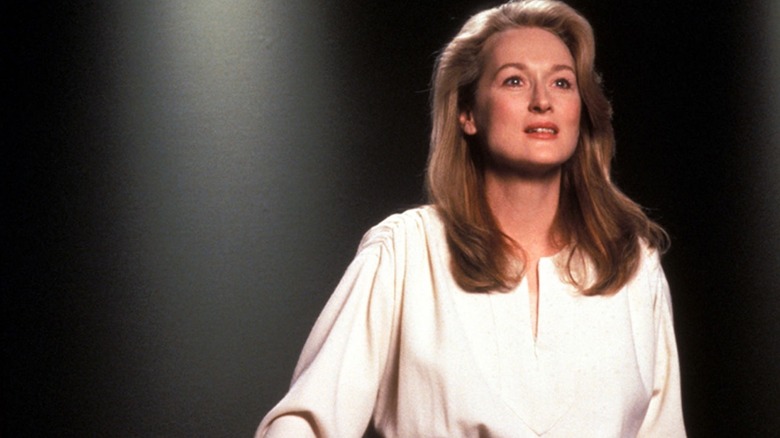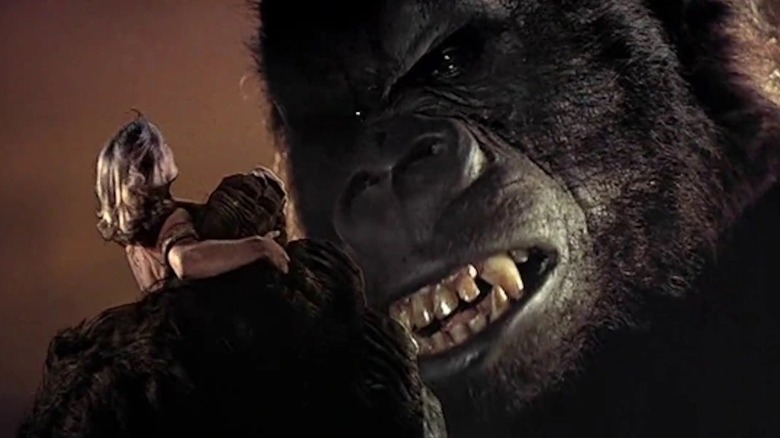The Classic Monster Movie That Almost Starred Meryl Streep
Hollywood has always been a boy's club. Worse than that, it's been a haven of sexual abuse. The town has buildings and theaters named after the likes of Columbia Pictures co-founder Harry Cohn and 20th Century Fox co-founder Daryl F. Zanuck, both of whom were notorious for coercing (or attempting to coerce) female stars into sex in exchange for work. For all of the breathtakingly gifted women who made it through Hollywood's sexist gauntlet to become movie stars, you can't help but wonder how many singular talents got destroyed by the town's monstrous gatekeepers.
Because talent truly didn't matter to these ghouls. They just wanted, in their view, a dazzling dame who could light up the screen with their looks and sign a contract nowhere near commensurate with their value to the studio. Some of the women in their employ could stand up to them. Joan Crawford once shut Cohn down by saying, "Keep it in your pants, Harry. I'm having lunch with [your wife] and [children] tomorrow." Crawford had the leverage (i.e., box office clout) to get away with such impertinence, but most did not.
The state of the industry may be a tad less galling today thanks to the reckoning of #MeToo, but it's hard not to feel that we are ever on the verge of backsliding when you see so many credibly accused (if not convicted) abusers continuing to work. And it's sobering to know that once upon a time, the greatest actor of the second half of the 20th century and beyond lost a role early in her career because a powerful producer thought she was "ugly."
Dino De Laurentiis thought Meryl Streep was 'too ugly' to star in King Kong
Dino De Laurentiis was a vitally important figure in the evolution of motion pictures. Without the Italian mogul, we might not have Federico Fellini's "La Strada" and "Nights of Cabiria," which probably means we wouldn't have Fellini at all, given that those two films basically put him on the world cinema map. He also bolstered the careers of David Lynch, David Cronenberg, and Michael Mann. Though he didn't have an artistic bone in his body, he took risks on up-and-coming artists because, basically, the production of movies was how he shot craps.
The man didn't know art, but he did know what he liked. And when it came to casting the leading lady in one of his heavy cinematic bets, like 1976's big-budget remake of "King Kong," he knew he wanted a dish. Given that this movie was practically a guaranteed blockbuster (set for release one year after "Jaws" surpassed "Gone with the Wind" as the highest-grossing movie ever made), De Laurentiis was going to see every up-and-coming starlet during production. He was looking for the next Fay Wray when the recent Yale School of Theater graduate Meryl Streep walked into his office. Greatness had crossed his threshold, but he did not see the next Fay Wray.
During an appearance on "The Graham Norton Show," Streep remembered, "He had this amazing office that looked all over Manhattan." Her awe quickly turned to horror, however, when De Laurentiis insulted her in a tongue that he must've thought she didn't understand.
As Streep told Norton, "I walked in and his son was sitting there, very excited that he'd brought in this new actress. And the father said to his son in Italian, because I understand Italian, he said, 'che brutta', you know, 'Why do you bring me this ugly thing?'" Rather than break down in tears, Streep responded, "I understand what you're saying, I'm sorry I'm not beautiful enough to be in 'King Kong.'"
The role went to another world-class, up-and-coming actor in Jessica Lange, and it nearly killed her career. Fortunately, The New Yorker's Pauline Kael realized Lange understood the assignment and compared Lange's performance to Carole Lombard's screwball comedy work. As for Streep, she won her first Oscar three years later and has done pretty well for herself in the interim.

